Should Biking While Drunk Be Illegal?
Biking intoxicated is illegal in some places and becoming so in others. But is that really what we need?
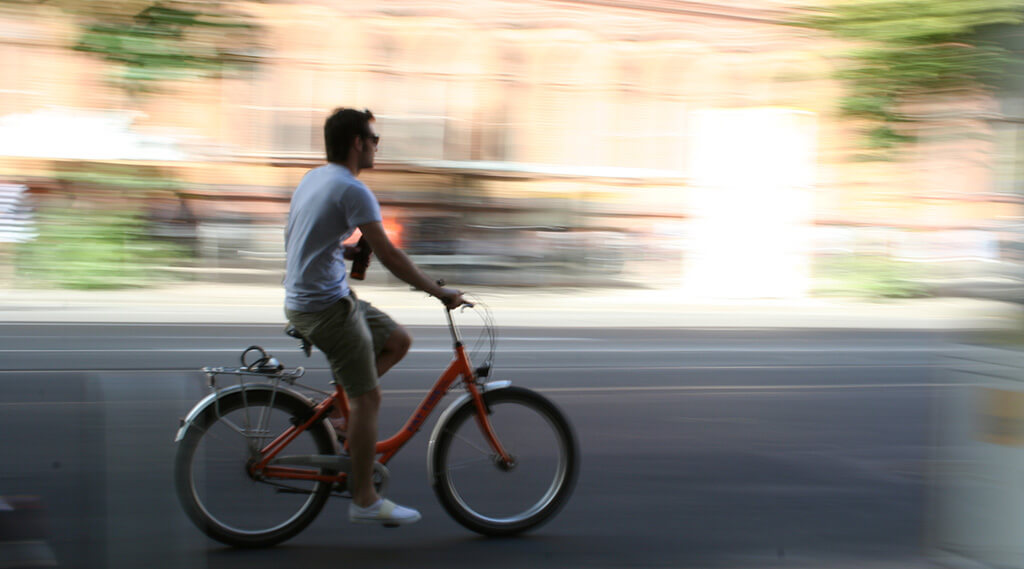
Beer biking in Berlin. Photo by Matt Rubens.
You don’t have to look much further than the proliferation of booze-based bicycle products to realize that the bike community, by and large, likes to drink. There are handcrafted leather holders to carry your a 6-pack, a growler, or a bottle of wine on your top tube, and cooler panniers which keep your 12-pack crisp and cold on the way to the beach. There’s a city bike with a bottle opener and cup-holder built in, and the handlebar cup-holder that is perfectly fitted to a standard can but not quite suitable for a coffee mug.
If you require a little more proof, then how about the multitude of bike-friendly bars and microbreweries popping up all over the world, or the growing availability of urban brewery tours by bike? At a time when drunk driving is regarded as the domain of only the dangerously irresponsible few, drunk biking – or drinking while biking – is generally thought of as harmless, and in the industry is outright celebrated.
But according to police in Montreal, Quebec, the frequency with which residents are pedalling around while more than just a little bit buzzed is presenting a safety hazard to the public. The Service de police de la ville de Montréal (SPVM) are currently requesting amendments to Quebec’s Highway Safety Code that would enable them to crack down on impaired cyclists. At present, the only provision instated makes it illegal to actually drink while riding a bicycle, but does nothing to deal with the issue of people leaving bars and getting on their bikes.
“Someone who’s inebriated while riding a bicycle represents a hazard for themselves and for others. This is why we’re concerned,” said Insp. André Durocher of the SPVM in an interview with CTV Montreal.
But others are less convinced. Suzanne Lareau, president of the provincial bike advocacy organization Vélo Québec, told CTV that the police department is looking for a problem where none exists. She argues that the only victim of a drunk cyclist is the cyclist themself, and public resources would be much better spent on combatting issues that actually kill people, such as dooring.
Drawing the line.
The issue is a complicated one, and is largely not given its deserved attention in the bike industry and wider community.
While biking drunk is undoubtedly much safer than driving while drunk, and Lareau is correct in her assumption that the injury tends to befall only the cyclist in question, the fact is that drinking and biking is routinely celebrated in the bike community without ever being accompanied by hard conversations about its potential dangers. While most people who take part understand their own limitations and don’t tend to ride around completely wasted, those that do the latter are not usually criticized or reprimanded, either privately or in the public discourse. Similarly, most people wouldn’t hesitate to prevent their friends from driving home while drunk, but very few would do the same for cycling.
In the interest of full disclosure, I once knocked two of my front teeth out while biking home drunk – I was living in Montreal at the time. I was more than just a little buzzed, but a far cry from hammered, and a disagreement between my front tire and a pothole I failed to notice sent me flying over the handlebars to headbutt the pavement in an act of revenge. It was a painful wake up call that resulted in a year and half spent in the dentist’s chair, $12,000 in dental bills, and a slight scarring on my upper lip. And yet, less than three years later, I’m back occasionally pedalling around a few beers deep in my new home city, albeit much more slowly and carefully these days.
The fact of the matter is, when biking is your main mode of transportation and you’re known to indulge in the occasional pint, biking a bit tipsy is almost a foregone conclusion. Your friends are riding home, your coworkers are riding home after happy hour – to drink a few beers then refuse to get on your bike would be inconvenient and almost bizarre. However, the knowledge that you can have a beer or two then ride home safely is a slippery slope to the false assumption that you can or should do the same after six or seven. It’s knowing where to draw that line – and advocating for others to do the same – where the bike community fails.
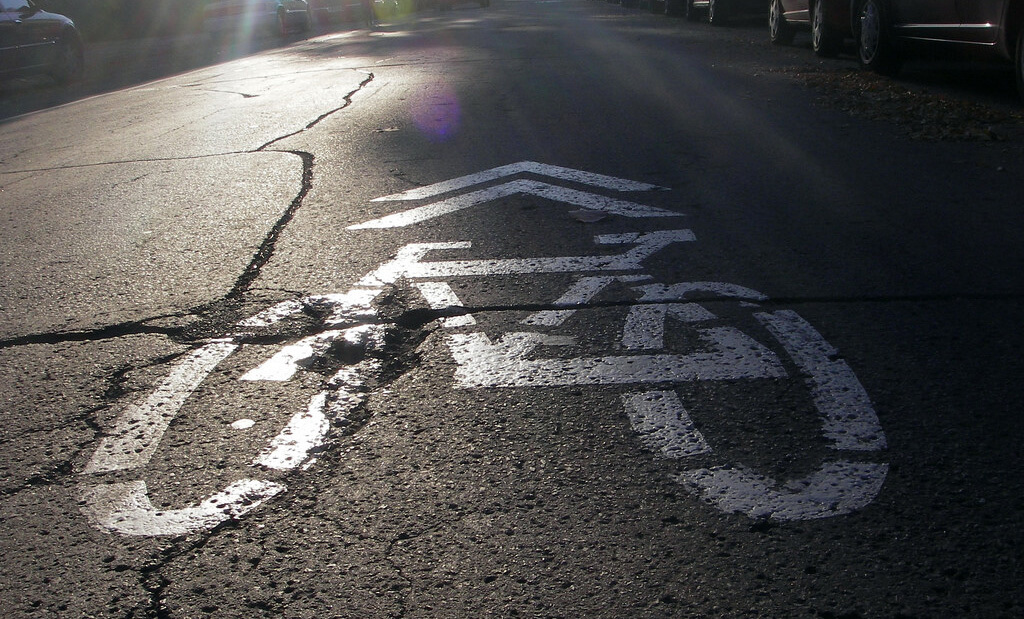
Tooth-smashing bike paths of Montreal. Photo by Daniel Fuller.
Are laws the answer?
Accurate statistics on drinking and biking are hard to come by, largely due to the lack of policing around the issue and the fact that scores of people bike drunk every day without winding up in the hospital. A 2007 government report in the UK found that 13% of cyclists killed in the previous year were above the legal limit for alcohol. But without recorded causation that could just as easily be interpreted as a lack of safe cycling infrastructure and an enthusiastic drinking culture across the UK. While most experts agree you’re more likely to hurt yourself than anyone else if cycling home drunk, a person who is so drunk they’d have trouble walking home could very easily swerve into traffic and cause a larger crash. Moreover, alcohol tends to increase negative cycling behavior such as biking quickly and recklessly, while reducing balance, judgement, and motor control. As more and more people on bikes begin to fill our streets, the risks posed by speeding, wobbly cyclists will only increase.
But if something needs to be done about drinking and biking, is a law the most effective way to go about it? In Vancouver, BC where I now live, impaired cyclists can be arrested for public intoxication under the Liquor Control and Licensing Act. If their actions cause a crash or result in a death, they’ll be held liable for damages or charged with criminal negligence, respectively. In California, cycling drunk can result in getting slapped with a CUI (Cycling Under the Influence), a misdemeanour conviction which will leave you with a $250 fine and a criminal record. To my knowledge, neither law has done much to curb rates of drunk biking in either place. In the UK, where the recorded 13% of cyclists killed in crashes were legally drunk, biking intoxicated has been illegal for years.
Cycling while drinking laws are notoriously difficult to enforce and even more difficult to convince people to take seriously. Moreover, an all out criminalization of biking under the influence that was strictly enforced would likely just result in a reduction in cycling generally, rather than a specific reduction in cycling drunk. Considering the minimal public safety hazard presented by slightly-intoxicated cyclists, and the huge fitness benefit of biking for transportation, it would be more detrimental to long-term public health if all of those people were to sit on the bus every day instead.
In my mind, the responsibility needs to fall on the bike community to keep ourselves and our friends safe. While of course we should continue to advocate for the things which protect cyclists and street users in general – better infrastructure and better driver education – we should also be having more conversations about the real dangers of drunk biking, and getting better at identifying its upper limits. Putting a complete halt to drinking and biking is unrealistic and, frankly, doesn’t sound very fun. Beers and bicycles are for the most part a happy marriage, and I’m willing to bet the relationship is here to stay. But putting a halt to getting sloshed and cruising around is something we all can and should play a part in.
Since falling off my bike, I’ve started wearing a helmet when I know I’m going to have a couple beers, and leaving the bike at home when I think I might have more than that. When I’m riding with friends, I ask that they do the same. Understanding the difference between riding home from a casual happy hour and a marathon drinking session may not be the difference between life and death, but it could just be the reason you get to keep all of your teeth.
Hilary Angus is the Online Editor at Momentum Mag. She knows a really good dentist in Montreal if anyone needs it. @HilaryAngus

Get your FREE copy of our new guide: Momentum Mag's E-Bike Guide
In this guide we explore some of the different ways an e-bike can provide solutions for different users, outline the different types of e-bikes available, give a briefer on the technological components, and offer some advice on purchasing your own electric bicycle.
22 Comments
Autumn Gear Guide
Find inspiration in our Gear Guide that will keep you out on your bike through wind or rain.
Download Now
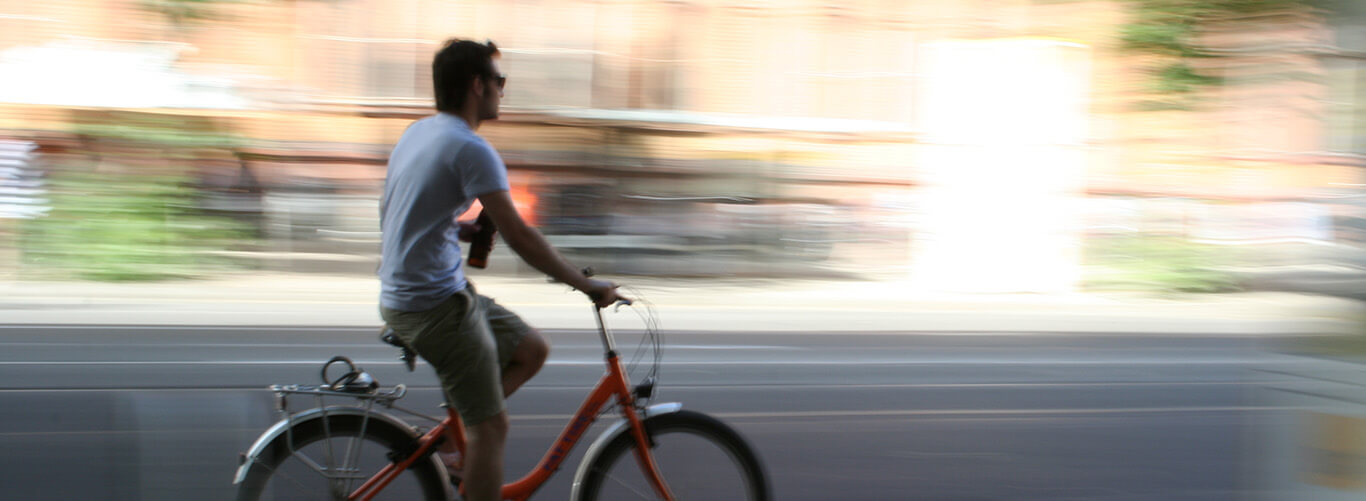
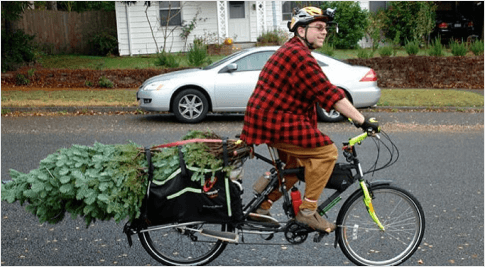
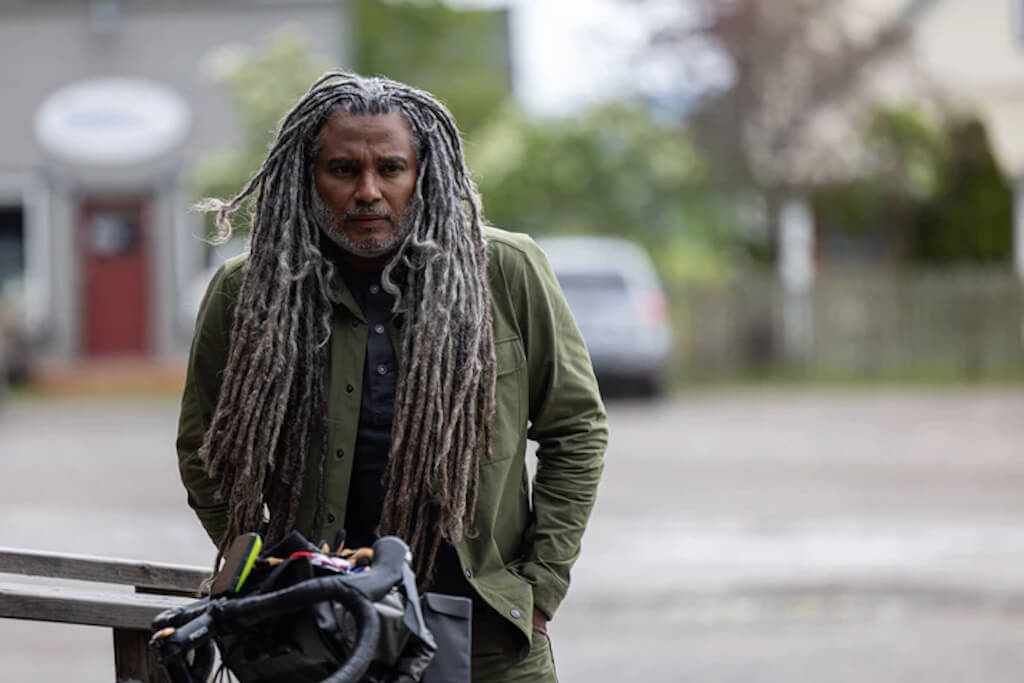
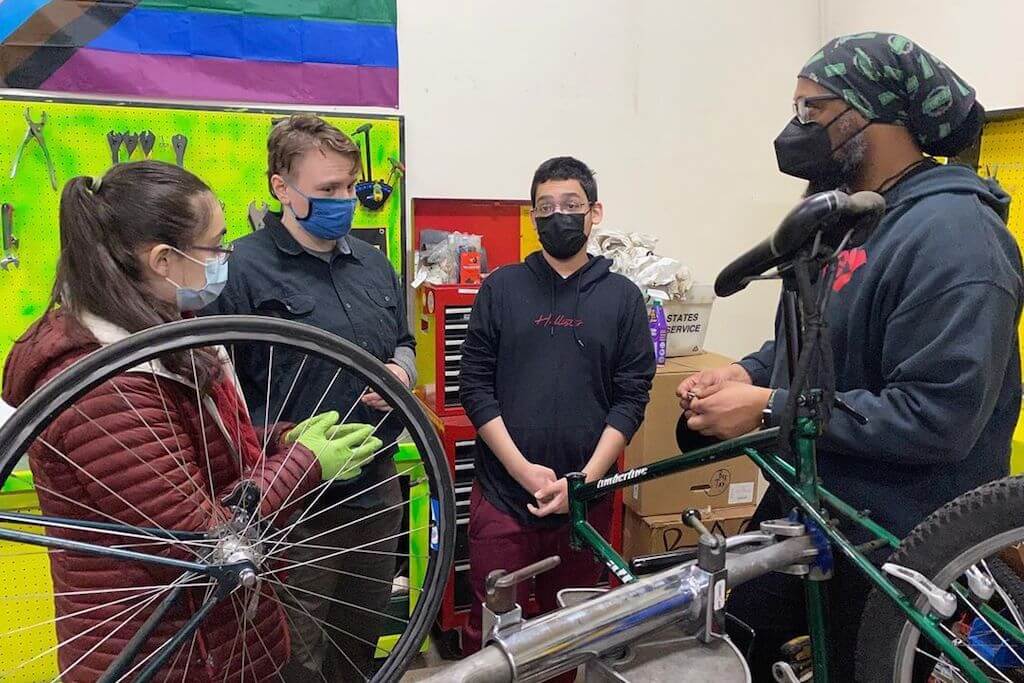
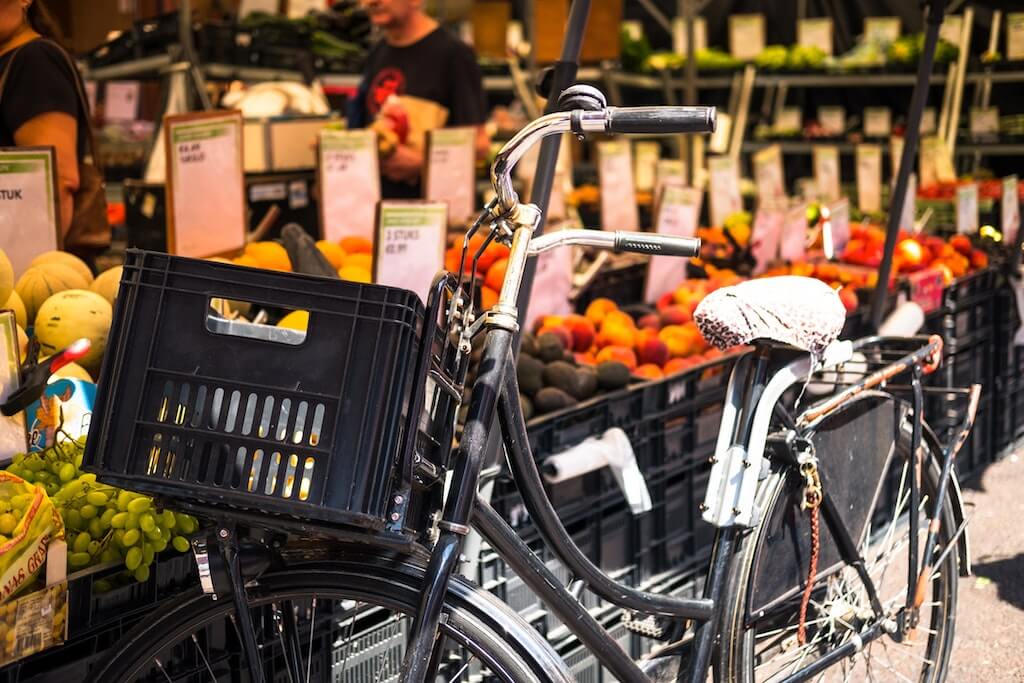

Sounds like your crash was due to poor road maintenance. A pothole doesn’t distinguish between a sober biker and a drunk one. I’m on the “drunk bikers present no danger to anyone but themselves camp” and I’m in that camp because it’s true. People say, “Yeah, but you could cause a more serious accident if someone in a car swerved and hit someone else,” or something to that effect, to which I reply, “Find me an occasion in our city where that has ever happened.” They never can, because it doesn’t happen. Drinking too much always carries risks, but if you’re on a bike, you assume 100% of that risk. It’s the socially responsible thing to do, especially compared to driving a car after drinking. Besides, (in the states at least) there are laws that govern this already. In most states, you can’t get a DUI, but you can get charged with public intoxication or wreckless endangerment, in the event you actually did cause a crash that injured someone else. I don’t know how things work in Canada, but any new law passed restricting or regulating bicycle use in the states tends to be….how to put it…. “selectively enforced” if you know what I mean. It becomes an excuse for the cops to roust people of color, basically. Riding bikes is the cure for many social problems; we shouldn’t racking our brains figuring out how to place new impediments to riding a bike in our cities. It’s useless and even counterproductive.
The assertions about drinking and biking presented in this article are overblown. It’s no more of an occurrence today than it was ten or twenty years ago. And, in all seriousness, it’s not that prevalent. It is occasional to rare – whereas drinking and car driving is an everyday issue. The matter of drinking and biking is so small, it’s not worth writing about.
‘ “Someone who’s inebriated while riding a bicycle represents a hazard for themselves and for others. This is why we’re concerned,” said Insp. André Durocher of the SPVM in an interview’ . Duh?? Someone who’s inebriated while doing anything represents some level of hazard – unless they are sitting on the couch at home about to fall asleep. Why not write an article about drinking while walking? I tell you why not – because the risk is small. A hazard exists, but the risk of anything devastating occurring is not worth focusing on it. The risks of damaging occurrence from drinking and biking don’t compare to drinking and car driving. When was the last time that anyone was killed anywhere from a drinking and biking event? Yet drinking and driving property damage, major injuries, and fatalities happen everyday. Let’s keep the focus on where it needs to be – drinking and driving… and not start ringing bells and raising red-flags to focus the authorities on a supposed biking problem that does not exist.
Alcohol is a slippery slope in general. There are laws against public drunkenness whether on or off a bike. Alcohol affects judgement, coordination and perception. Moving in this world is a responsibility. The bigger your vehicle and the faster you are moving the more dangerous an intoxicated person is to themselves and others. Responsible drinking means not diminishing one’s faculties to the point that they are dangerous. Most fatalities on bicycles are under the influence. Add an electric motor to the bike and the danger is intensified. What even puts any doubt on the legality is the focus of the legal system on punishment rather than rehabilitation. Anyone who drinks and drives, or rides their bike or ebike in public is a public hazard which the public needs to be protected from. Anyone who puts their fellow citizens in danger by such irresponsibility has a problem as well and for everyone’s protection needs rehabilitation.
in most if not all states here in the US the bicycle is considered a vehicle and the rules of operating a vehicle intoxicated are the same IE: illegal one riding a bicycle intoxicated could be busted for RWI (riding while intoxicated) – car-bike-motorcycle all the same – and besides this is a right that cyclists have been given IE: to be considered a vehicle and so we cyclists must obey ALL the rules we should be treated no differently
I think existing laws already cover this. While in most states you can’t get a DUI, as “driving” most often means operating a motor vehicle, you can get arrested for lots of other stuff – public drunkenness, reckless endangerment, for example. No need to make a new law. If anything, the fact that a drunk cyclists only presents a danger to him/herself should make people realize that biking home from the bar should be considered a legitimate alternative to drinking and driving. Besides, like most all laws governing cycling, it will be selectively enforced. Guess who the police will target more…
Cycling while drunk IS already illegal in MOST places. You mentioned the UK. It has been illegal since 1872 since the offence is to be “drunk in charge of a carriage”. The possible fines and other penalties are the same for a motor vehicle, except for points on the licence and possible driving bans. Enforcement, however, is probably very different. Police would much rather you be on a bicycle drunk than behind a wheel, where you’re far less likely to kill someone.
As far as you hitting a pothole while drunk cycling, and knocking your teeth out (how awful!) those things can happen when you are sober too. I’ve hit potholes before simply because I was cycling whilst deep in thought.
Here here; I was completely sober when I chipped my front tooth riding a bike (with soft things hanging off the front handlebars which caught in the front fork,oopsie). And never injured when riding home after drinking. Sometimes sobriety makes one overconfident… 😉
This a totally dumb discussion. With this type of thinking the next thing that we will see is whether a person should be allowed to drink alcohol in a restaurant or bar because they may fall off the stool and get hurt… or maybe walk into the wall when going to the restroom. Has the devastation of cycling after drinking become so much of a public calamity (with people getting hurt maimed and killed) that we now have to elevate policing against it?
Exactly. Cyclists, drunk or sober, very rarely injure anyone else, much less kill them…unlike motorists who kill lots of people every day. In the U.S. last year, there were fewer cyclist-on-pedestrian fatalities than there were people dying from falling off of stuff taking selfies or by sharks. It’s not exactly an epidemic. Now, in places like NYC or San Fran, inconsiderate roadies might injure pedestrians at a higher rate, but that’s not necessarily correlated to drinking.
The fact of the matter is, when driving is your main mode of transportation and you’re known to indulge in the occasional pint, driving a bit tipsy is almost a foregone conclusion. Your friends are driving home, your coworkers are driving home after happy hour – to drink a few beers then refuse to get in your car would be inconvenient and almost bizarre.
thanks for this idiotic article, it gave me the motivation i needed to unsubscribe
I can tell you from experience that if you are very drunk, the bike is the best regulator of them all because you’ll never get on the bike. What happens is you wind up walking the bike home (with it propping you up like a walker) or you chain it up and call a cab. A car let’s you drive it no matter how pie faced you are.
Since public intoxication is illegal, no matter on a bike, skateboard, park bench or in a tree, why are we even having this discussion?
An interesting article. I think it’s important to have these types of discussions. It’s prompted me to check what the road rules say about this in my own country (Australia).
And?
Cycling while drunk can hurt more then the cyclist, if a cyclist strikes a pedestrian, then that pedestrian can be injuried, if the cylist causes another to swege then all others are in danger as well
Sure, while we’re at it, let’s make walking while drunk a ticketable offense too! (Jeeesh) Sounds like just another way to tax people for being human.
Rights and responsibilities.
Cyclist’s fare best when they act and are treated as any vehicle on the road.
If we want to be taken seriously as cyclist’s on the road we must also live by all the laws, whether we like them or not. It is up to all of us to be the change we wish to see in the world. It’s not being held to a higher or different standard, but the same as those driving a car.
This is the same selfish arrogant discussion as the one about stop signs and red lights, riding on sidewalks and transit platforms, riding against traffic, etc., etc., etc.
What a silly discussion. Tell me how many times you’ll hear about this in the news: “Alcohol impaired cyclist was travelling at speeds more than forty miles per hour in the wrong direction, and plowed into a motor vehicle smashing and killing all the occupants.” Any possibility of this or other similar headlines? The drunk cyclist has a hard time just moving. Wow, what a big threat to society. Let’s get real, and not try to create issues where no issues exist.
Comments are closed.